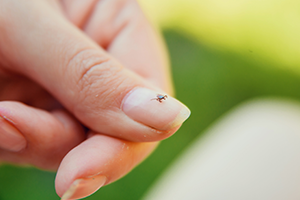
Ticks are common on Long Island, and finding one on your pet, or worse yet, on yourself or a family member is never a pleasant experience. You’ve probably also heard that ticks can spread Lyme disease and other dangerous diseases, but what are the risk factors really? At Arrow Exterminating Company, we have extensive experience dealing with ticks, and yes, they are something you should watch out for, but with a little preparation and prevention, it’s easy.
In this handy guide, we’ll tell you everything you need to know, including the common types of ticks on Long Island, what risks they present, and how you can protect your property and your family.
Common Ticks on Long Island
- American Dog Ticks: They often attach themselves when dogs root around in wooded areas or areas with dense vegetation. Dogs are a common host for the American dog tick, but these ticks will consume the blood of almost any animal, including humans. American dog ticks transmit many tick-borne diseases including Rocky Mountain Spotted Fever and Tularemia.
- Deer Ticks: The most notorious of all ticks for their ability to transmit Lyme Disease, deer ticks are as small as a sesame seed and can carry several other dangerous diseases besides Lyme.
- Lone Star Ticks: Lone star ticks are not from Texas; they get their name from the white mark on the females’ backs. Typically found in shaded areas because they’re vulnerable to direct sunlight, these ticks transmit diseases like Ehrlichiosis and Tularemia, and in rare instances, can cause Alpha Gal Syndrome, which acts like a meat allergy.
- Asian Longhorned Tick: This tick had not been identified in the United States until 2017; now it has spread to nearly two dozen states including New York, New Jersey, and Connecticut. Biologists are still studying the Asian Longhorned Tick and the risks it presents here in North America.
Need an Estimate for Tick Control?
Are Tick Bites Dangerous?
The good news is that most tick bites don’t result in any complications aside from some minor irritation and discomfort. However, you should treat any tick bite as if it has the potential to lead to tick-borne disease. Tick-borne diseases can be serious and require medical attention, so it’s important if you or anyone you’re caring for gets bitten by a tick, continue monitoring the situation.
For more information, check out our full-length article >> Are Tick Bites Dangerous?
When to Check for Tick Bites
If you spend time in an outdoor environment where they may be present during the spring and summer in this region, we recommend checking yourself for ticks and tick bites as soon as you get home. Your risk of contracting some tick-borne diseases may increase the longer the tick is attached to you.
How to Check for Tick Bites
Take a shower as soon as you get home and check your body for ticks. Be sure to check yourself in these areas:
- Under arms
- Inside the belly button
- Back of the knees
- In and around ears
- In your scalp and around all head and body hair
- Around the waist
- Between the legs
Can You Prevent Ticks?
If your property has any wooded areas or areas thick with vegetation, you may be harboring ticks. In this case, we recommend professional tick control to eliminate the population. If you have pets, tick control and prevention are doubly important because ticks can transmit many tick-borne diseases to animals as well.
At Arrow, we offer highly effective lawn treatment for ticks that will eliminate the active population. Once they’re eliminated, we’ll provide expert recommendations that will enable you to prevent ticks over the long term.
For more information about tick prevention on Long Island, check out our full-length article >> How to Prevent Ticks and Tick Bites
When Is Tick Season on Long Island?
Ticks can be a year-round problem on Long Island, but they’re significantly worse during the spring and summer months. Most ticks become dormant during the cold season, but they don’t die—they become active again as soon as the weather starts to grow warm and remain active until the temperature falls again.
Protect Yourself From Ticks
If you’re still not sure what kind of ticks are on your property, have the professionals at Arrow Exterminating provide an inspection and help you determine the right solution. To get started, contact Arrow Exterminating today.
Back to Flea and Tick Exterminators – Control – Removal
